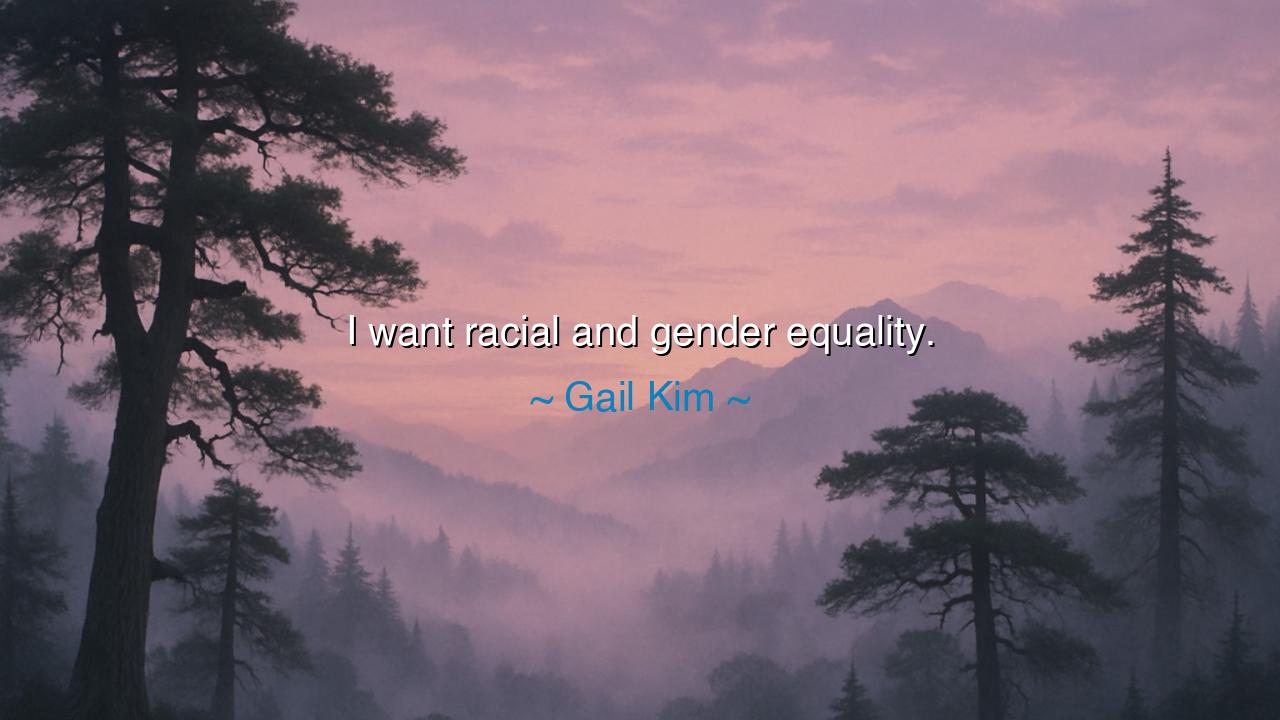
I want racial and gender equality.






In the vast expanse of human history, the pursuit of equality has been a thread woven through the fabric of countless struggles and triumphs. Gail Kim's words, “I want racial and gender equality,” are a clarion call that echoes the ancient yearning for justice, fairness, and the recognition of human dignity in all its forms. Her statement is simple, yet profound—encapsulating two of the most deeply rooted struggles in human history: the fight for racial equality and the relentless demand for gender equality. It is a call to action, an invitation to confront the inequalities that persist in the present and to demand a future where all people, regardless of race or gender, are valued equally.
The ancients themselves were no strangers to these struggles. In Ancient Greece, the idea of equality was primarily reserved for the male citizens, while women, slaves, and foreigners were excluded from the rights and privileges of full citizenship. Even in Athens, widely regarded as the cradle of democracy, the noble ideals of equality and justice were limited by rigid boundaries of race, gender, and social class. The philosopher Plato, though he advocated for a form of equality within the ideal state, still held views that excluded women from certain roles, relegating them to the domestic sphere. Yet, there were those—like Aristotle—who questioned the natural hierarchies of society, arguing that some aspects of equality should be universal. Kim’s desire for racial and gender equality is a modern reflection of these ancient debates, one that seeks to push beyond the constraints of societal norms to recognize the inherent worth of every individual.
Consider the story of Sojourner Truth, an African-American woman and former slave who became a powerful advocate for both racial and gender equality in the 19th century. Truth’s famous speech, "Ain't I a Woman?" delivered at the Ohio Women's Rights Convention in 1851, called out the hypocrisy of a society that preached equality but denied it to women of color. She spoke of the intersectionality of race and gender, challenging the prevailing notions that women, particularly Black women, were inferior. Truth’s courage and eloquence resonated across generations, inspiring future generations to continue the fight for equal rights for all people, regardless of race or gender. Gail Kim’s words echo this legacy, as she too seeks a world where race and gender do not define one’s opportunities or worth.
In the context of gender equality, Kim’s words also align with the struggle that has defined much of the modern era. Women, throughout history, have fought for their rightful place in the world, battling not only for their legal rights but for their recognition as equal contributors to society. The ancient story of Artemis, the Greek goddess of the hunt, is a powerful example of the strength and agency women have held since ancient times. Artemis, independent and fiercely autonomous, represents the ideal of a woman who operates outside the traditional constraints of her gender. Her story calls us to honor the divinity of feminine power, even in a world that often seeks to suppress it. Kim's desire for gender equality is a call to acknowledge and celebrate this same strength in women today.
The fight for racial equality has its own deep roots in the ancient world. In Rome, although the notion of citizenship existed, it was often limited by ethnicity and social class. The Romans viewed Romans as the superior group, with foreigners or those from conquered lands seen as lesser. Yet, there were those who believed that true justice could only be realized when equality was extended to all people, regardless of their origins. Cicero, the Roman philosopher and statesman, understood that justice was not a privilege to be bestowed on a select few, but a universal right. His ideas about law and equality laid the groundwork for modern concepts of citizenship and human rights, principles that continue to inform our efforts toward racial equality today.
The lesson we take from Kim’s quote is clear: the fight for racial and gender equality is not only about correcting historical wrongs but about creating a future where everyone has an equal opportunity to thrive. It calls us to recognize that equality is not just a matter of laws or policies, but a fundamental shift in how we view each other as human beings. It is a call to action—one that requires us to dismantle the systems of inequality that still persist and to build a world where all people, regardless of race or gender, are given the opportunity to fulfill their potential.
In our own lives, let us take up this call for racial and gender equality with purpose and determination. Whether we are working toward justice in our own communities, standing up for those whose voices have been silenced, or advocating for policy changes that promote equality, we must be unwavering in our commitment to creating a world where everyone has the same rights, opportunities, and dignity. Just as Sojourner Truth and countless others fought for equality against immense odds, we too must continue this fight—knowing that true equality will not be granted, but earned through the relentless efforts of those who dare to believe in a world of justice for all.






AAdministratorAdministrator
Welcome, honored guests. Please leave a comment, we will respond soon